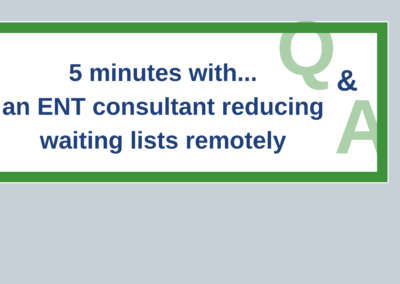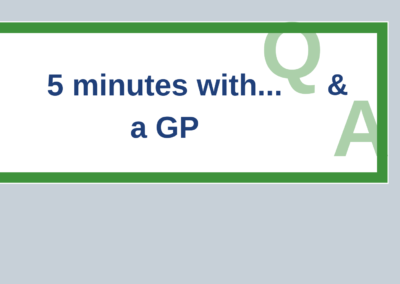‘In a crowded NHS specialist setting, this all helps so we can see those patients in tertiary care who really need us.’
We spoke with three NHS consultants who provide Enhanced Advice & Guidance (A&G) via Consultant Connect to find out what types of queries they receive and the benefits this provides to all involved. Drs Rex J Polson, Udi Shmueli, and Nick Silver provide both advice to local clinicians and on the National Consultant Network (NCN) to out-of-area healthcare professionals. You can read the full case study below or click here to download a PDF version.
The consultants agreed that the secure and rapid nature of Telephone A&G helps improve knowledge and expertise for Primary Care clinicians to support future management of patients with similar conditions. It also benefits the patient journey as it reduces avoidable admissions and pressures on A&E, improves access to the right services, and helps identify those who need to be seen urgently:
‘This service not only provides much-needed urgent care advice for patients, but it also engenders better liaison and collaboration with Primary Care colleagues. As a consultant, I have learned a lot about what can happen in Primary Care. I have gained insight into neurological services across the country, and how long it can take patients to be seen urgently. It’s great to speak with GPs about patients, and their feedback has been very encouraging.’
– Dr Nick Silver, NHS Consultant Neurologist.
‘Gastroenterology is a multi-organ specialty handling a large number of organ areas, covering the oesophagus, stomach, liver, spleen, large bowel and pancreas. So, it’s more likely that patients will present to their GP for advice relating to one or more of those organ areas compared to more niche areas of medicine.’
– Dr Udi Shmueli, NHS Consultant Gastroenterologist.
What are the most common queries you receive?
‘For neurology, headaches are by far number one. Others include the management of Parkinson’s, especially when the patient is too frail to go to hospital, epilepsy drug management, sensory disturbance, and distinguishing peripheral neuropathy from restless legs.’
– Dr Nick Silver.
‘We regularly interpret blood and imaging abnormalities, but also discuss patients with functional symptoms, who are often not responding to treatment, and patients with long-term conditions. These queries are often relatively straightforward for us to resolve, and, after a short conversation, have a large impact in improving the patient’s care.’
– Dr Rex J Polson, NHS Consultant Gastroenterologist.
Patient Examples
Neurology – Dr Nick Silver
‘A young female presented with left-sided numbness and weakness affecting her face, arm, and leg. She had been seen in hospital and a transient ischaemic attack (TIA) was considered, but various tests, including a CT, were negative. Her GP had requested a brain MRI, which showed a partially empty sella (pituitary fossa) and wanted advice on these findings.
The GP called me via Consultant Connect and we discussed the nature of the patient’s symptoms, and I advised on an urgent referral to neurology; however, as urgent referrals in the patient’s area could take in excess of 6-9 months, I advised an urgent optician’s assessment to look at optic discs and visual fields, referring onwards as necessary.
I also explained the need for certain lifestyle measures, to avoid the risk of stroke, and directed the GP towards relevant patient literature.’
Gastroenterology – Dr Rex J Polson
‘A GP called via the service to ask for advice about treatment for H. pylori in a young child. Although not a paediatrician, as an adult gastroenterologist, I was able to discuss whether or not this warranted treatment, rather than discussing specific treatment methods. The GP found this extremely useful and was very pleased to be able to talk it through with a specialist.’
Gastroenterology – Dr Udi Shmueli
‘In many parts of the country, there are gaps in the communication between Primary and Secondary Care. Patients have had colonoscopies or flexible sigmoidoscopies due to diarrhoea, and consequently, colitis has been diagnosed. The report to Primary Care often indicates that a gastroenterology appointment has been arranged, with no treatment started, but the appointment isn’t for several months. The Primary Care clinician and the patient are then both in limbo and unsure of how to proceed.
Answering A&G queries via Consultant Connect allows me to recommend treatment in the meantime. A lot of treatments for gastroenterology are protocol-led, and therefore straightforward, meaning the patient doesn’t need to attend A&E, ensuring the patient gets the care they need whilst relieving pressure on A&E departments.’
What assurance would you give clinicians who are hesitant about seeking advice from an out-of-area clinician?
‘The similarities between advice from a local consultant and an out-of-area consultant are greater than the differences! What Primary Care clinicians will receive is a sense of how urgent the problem is, and it’s usually a lot less urgent than they initially thought. We provide them with reassurance and advice that will often allow them to manage the patient in a Primary Care setting without needing to refer them to Secondary Care.’
– Dr Udi Shmueli.
‘The clinicians sometimes think we can’t help because we’re not consultants from their local hospital, but I say, “run it past me and we’ll see where it goes”. And, although we can’t facilitate admission or urgent review to the clinician’s local unit, we can usually provide advice on management which supports the GP and patient prior to admission. This helps them prioritise the urgency of what they’re trying to arrange locally.’
– Dr Rex J Polson.
What effect does Telephone A&G have on patients with long-term conditions?
‘If a patient has or has had, a label of inflammatory bowel disease (IBD), and they present with a change of bowel habit or bleeding, the immediate assumption is that it’s a flare of IBD. When you talk it through, in some cases it may be more likely to be an infective episode.
Also, depending on the patient’s history, it could be more serious. For example, if it’s an elderly patient who hasn’t had IBD for 30 years and is experiencing rectal bleeding, I’d be more worried about the potential for bowel cancer than IBD.
Having the conversation with a consultant helps the clinician find the correct direction they should be pursuing for the patient, and puts them on the right pathway.’
– Dr Rex J Polson.
What are the benefits for you?
‘I feel it truly complements my work in the NHS and I feel impassioned to support my Primary Care colleagues and do the best for these patients.’
– Dr Rex J Polson.
‘I really enjoy providing advice. I’ve been answering calls for 3 years, and I take between 15 and 16 calls a week, which takes approximately 45 minutes of my time overall, and I’m able to improve the rate of referrals. I think Consultant Connect is the way forward; it’s very neat and works really well.’
– Dr Udi Shmueli.
‘It’s not arduous to provide guidance, and it makes me think practically as to what is likely or unlikely, and what mustn’t be missed. Many patients avoid unnecessary Secondary Care appointments as our advice often will resolve their issues. In a crowded NHS specialist setting, this all helps so we can see those patients in tertiary care who really need us.’
– Dr Nick Silver.
To download a PDF version of this case study please click here.
If you have any questions about this service, please get in touch on 01865 261467 or at hello@consultantconnect.org.uk.




